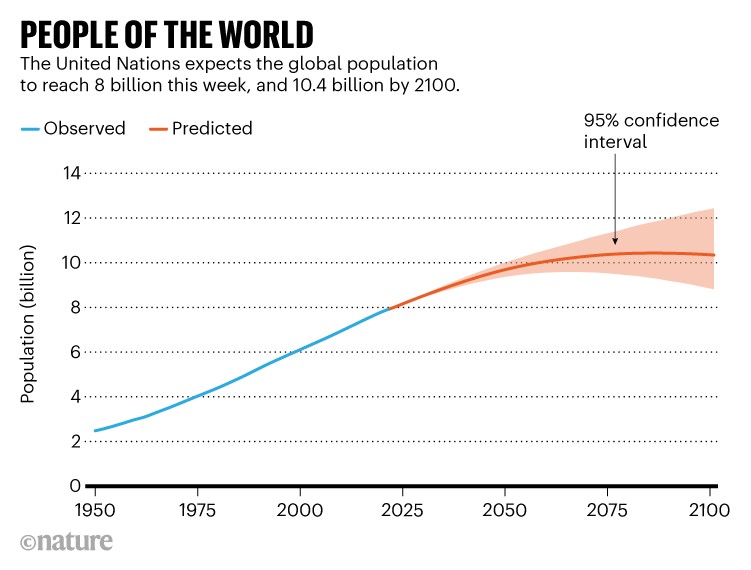The Day of Eight Billion
Posted: Wed Nov 16, 2022 9:30 am
Meant to post this yesterday, but didn't. So now I've missed the actual "celebratory" day...but it's really sort of "The Week of Eight Billion" because it's only guesswork.
Still, it still gives one pause and reason to ponder.
Although the latest UN world population update, published last July, revised the projected number down slightly for the long-term forecast--10.4 billion people by 2100 rather than 11 billion--November 15, 2022, remained dubbed "The Day of Eight Billion": the day when the world population counter hit 8 billion human beings.
To put that in perspective, we passed the 7 billion mark just 12 years ago in 2010. We hit 6 billion in 1998, and 5 billion in 1987. The world's population has increased 62.5% since 1987.
If you were born in 1974, the world population has now doubled just in the 48 years you've been around. Col. Jeff Cooper founded the American Pistol Institute (later Gunsite) in 1976.
If you were born in 1960, the world reached a total population of 3 billion that year. We hit 1 billion in 1804, 28 years after the Founders signed the Declaration of Independence, and we crossed the 2 billion mark in 1930, nine years before the start of WWII. In 1800, only about 3% of the world's population lived in urban areas. By the year 2000, that percentage had increased globally to 47%, then to 50.5% by 2010. By 2050 some projections show that 70% of the population will be urban.
Not counting the U.S. territories, America's population in July 2021 was 331.9 million. Estimates are that the figure stands at 333.297 million right now. That means the 50 states represents 4.166% of the world's population. China has 17.63% of the global population, followed by India with 17.37%. Russia is down in 9th place with 1.775%.
If nothing else, a doubling of the global population in the last 48 years, since 1974--and the majority of that population now living in urban areas--gives a different perspective to situational awareness than it existed when Col. Cooper published Principles of Personal Defense in 1972, the book that first codified Cooper's Color Codes.

Still, it still gives one pause and reason to ponder.
Although the latest UN world population update, published last July, revised the projected number down slightly for the long-term forecast--10.4 billion people by 2100 rather than 11 billion--November 15, 2022, remained dubbed "The Day of Eight Billion": the day when the world population counter hit 8 billion human beings.
To put that in perspective, we passed the 7 billion mark just 12 years ago in 2010. We hit 6 billion in 1998, and 5 billion in 1987. The world's population has increased 62.5% since 1987.
If you were born in 1974, the world population has now doubled just in the 48 years you've been around. Col. Jeff Cooper founded the American Pistol Institute (later Gunsite) in 1976.
If you were born in 1960, the world reached a total population of 3 billion that year. We hit 1 billion in 1804, 28 years after the Founders signed the Declaration of Independence, and we crossed the 2 billion mark in 1930, nine years before the start of WWII. In 1800, only about 3% of the world's population lived in urban areas. By the year 2000, that percentage had increased globally to 47%, then to 50.5% by 2010. By 2050 some projections show that 70% of the population will be urban.
Not counting the U.S. territories, America's population in July 2021 was 331.9 million. Estimates are that the figure stands at 333.297 million right now. That means the 50 states represents 4.166% of the world's population. China has 17.63% of the global population, followed by India with 17.37%. Russia is down in 9th place with 1.775%.
If nothing else, a doubling of the global population in the last 48 years, since 1974--and the majority of that population now living in urban areas--gives a different perspective to situational awareness than it existed when Col. Cooper published Principles of Personal Defense in 1972, the book that first codified Cooper's Color Codes.
